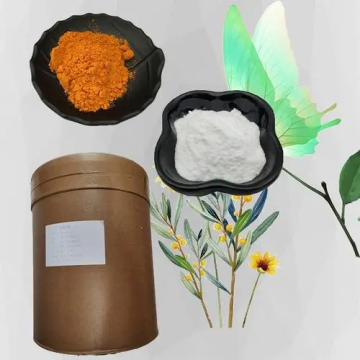
Privacy statement: Your privacy is very important to Us. Our company promises not to disclose your personal information to any external company with out your explicit permission.
![]() February 07, 2022
February 07, 2022

Tannic acid is an organic substance with the chemical formula c76h52o46. It is a kind of tannin obtained from gallnut. It is yellow or light brown light amorphous powder or scale; Odorless, slightly special smell, extremely astringent taste. Soluble in water and ethanol, easily soluble in glycerol, almost insoluble in ether, chloroform or benzene. When the aqueous solution meets with the iron salt solution, it turns blue and black. Adding sodium sulfite can delay the discoloration. In industry, tannic acid is widely used in tanning and making blue ink. Tannic acid coagulates protein.

Function and use
As astringent, it can precipitate protein and form insoluble complexes with alkaloids, glycosides and heavy metals.
It is mainly used locally. Its 11% ~ 20% ointment is used for exudative ulcer, scald, bedsore, hemorrhoids, eczema, etc., and its 15% ~ 20% glycerin solution is used for stomatitis, tonsillitis, pharyngitis, etc. it is also used for detoxification. When dehydrated morphine, Shiniang, digitalis, lead, silver, copper, zinc and other poisons are poisoned, it can be used for gastric lavage, and now it has been replaced by other detoxifying drugs; When used for colonography, add 0.25 ~ 0.5% of this product into barium sulfate enema to clean the colon and facilitate development.
Tannic acid can inhibit the activity of snake venom protein and has a strong detoxification effect on Cobra and other toxins (it can also be used for wound cleaning when bitten by poisonous snakes). Bacteria in the mouth secrete glycoside transferase, which promotes the synthesis of sucrose and glucan, and bacteria stick to the surface of teeth. Green Persimmon powder tannin can prevent bacterial growth, inhibit glycoside transferase activity and glycoside synthesis, so as to reduce the formation of dental caries. Japan already has corresponding products.
Treatment of intestinal bacterial infectious diseases: for example, RG tannic acid (rhubarb or other plants) used as ADP enzyme inhibitor is used in combination with other antibiotics. Inhibiting mutation is effective in preventing UV induced skin cancer and skin aging.
purpose
1. It can be used as food Antioxidant. It is generally used after mixing with vitamin E, gallic acid, etc.
2. Tannin can be used as viscosity reducer and filtrate reducer of water-based drilling fluid, and can improve the quality of filter cake. It is also used for tanning raw hides to convert them into leather. Tannin has the activity of reacting with proteins, polysaccharides, alkaloids, microorganisms, enzymes and metal ions, and has the characteristics of antioxidant, free radical capture, bacteriostasis and derivatization. It is more and more widely used in food processing, fruit and vegetable processing, storage, cosmetics, medicine and water treatment.
3. Tannic acid can combine with protein to produce water-insoluble tannic protein, so adding it to shampoo can prevent the dissolution of hair fiber protein and protect hair. Using it in nail products can increase the strength of nails. Gallic tannic acid and isogallic tannic acid have strong free radical scavenging effect. Their effect is similar to that of gallic acid and catechins. They can be used in skin care products to prevent sunscreen and brighten the skin. Tannic acid has astringency and antibacterial properties. It is clinically used to treat local bleeding. It can be used in toothpaste to protect teeth and prevent gum bleeding.
4. It is mainly used in industries such as medicine, ink, printing and dyeing, leather and metallurgy and water treatment. Tannin has the functions of flocculation, deoxidation, scale inhibition and sterilization in the process of water treatment. Because there are a large number of hydroxyl groups and carboxyl groups produced after partial hydrolysis in the molecular structure, they form complexes with calcium and magnesium ions in water to prevent calcium and magnesium ions in boiler water from forming scale, and also reduce the deposition of calcium sulfate in cooling water and play a role in dispersion. In addition, the cohesion of tannin can gather the sediment into water slag and discharge it from the boiler and cooling water system through sewage discharge.
5. It can be used as clarifier of low alcohol wine and fruit wine. It can also be used as leather tanning preparation.
6. Tannic acid is used for chromium free passivation of zinc coating.

The above is the Tannic Acid ---- Can Coagulate Protein we have listed for you. You can submit the following form to obtain more industry information we provide for you.
You can visit our website or contact us, and we will provide the latest consultation and solutions
Send Inquiry
Most Popular
lastest New
Send Inquiry
Related Products List
Mobile Site


Privacy statement: Your privacy is very important to Us. Our company promises not to disclose your personal information to any external company with out your explicit permission.

Fill in more information so that we can get in touch with you faster
Privacy statement: Your privacy is very important to Us. Our company promises not to disclose your personal information to any external company with out your explicit permission.